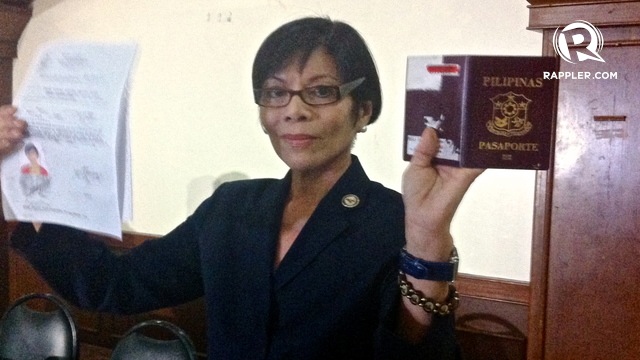SUMMARY
This is AI generated summarization, which may have errors. For context, always refer to the full article.

MANILA, Philippines – A candidate barred from the Marindique congressional race this year has accused Supreme Court (SC) Associate Justice Presbiterio Velasco Jr of “wielding his influence” to make the tribunal uphold her disqualification to favor the justice’s son.
Regina Ongsiako Reyes said Velasco, whose son Lord Allan Jay Velasco she challenged in May, used “his unelected position” to influence the High Court into dismissing her petition to stop the Commission on Elections (Comelec) from disqualifying her.
“What we have is one undeniable fact – that is, my opponent is the son of a sitting Justice of the Supreme Court,” Reyes said in a press conference on Thursday, July 11. She will file a motion for reconsideration, her lawyer said.
Allan Velasco ran for re-election as congressman of the lone district of Marinduque in 2013. Reyes – daughter of incumbent Gov Carmencita Reyes – defeated Velasco by a lead of around 4,000 votes.
Although Gina Reyes belonged to a family that has represented Marinduque’s congressional district since 1984 – and she’s married to Batangas 2nd District Rep Hermilando Mandanas – she had never been a congresswoman.
In 7-4-decision penned by Justice Jose Perez, the Supreme Court affirmed on June 25 Comelec’s decision to disqualify Reyes for allegedly being a naturalized American, citing a blog by a certain Eli Obligacion as basis.
Justices Velasco, Jose Catral Mendoza, and Estela Bernabe inhibited themselves from the case for “personal reasons.” Justice Diosdado Peralta absent.
In a dissenting opinion, Justice Arturo Brion said the court “hastily” judged the case without hearing both parties. “The Court should at least hear and consider both sides before making a ruling that would favor the son of a Member of the Court.”
Reyes said Brion’s dissenting decision showed why Justice Velasco “is the overriding circumstance that changed jurisprudence.”
“This is an instance where a Justice of the highest post wielded his influence to reverse jurisprudence in order to benefit his family,” Reyes said. The decision, she said, was “a travesty of justice.”
Citizenship
On the issue of her citizenship, Reyes claimed in her petition that the Comelec “gravely abused its discretion” when it took the blog article of Obligacion as evidence.
Obligacion showed documents of Reyes using her US passport on June 30, 2012, and records from the Bureau of Immigration (BID) showing that she is an American citizen.
But Reyes claimed she has always been a natural born Filipino, having been born in the Philippines of Filipino parents. She added that although she acquired American citizenship because of her marriage, she renounced it as evidenced by her Philippine passport and a certificate issued by the Bureau of Immigration.
“These are documents that I am a Filipino. These were the evidence that the Comelec refused to receive,” she claimed.
The majority of justices said Reyes’ contentions were incorrect. They said the Comelec “is not bound to strictly adhere to the technical rules of procedure in the presentation of evidence.” It added that the Comelec merely applied the qualifications prescribed by Section 6, Article VI, of the 1987 Constitution.
But Justice Brion, in his dissenting opinion, said, “How the law on evidence would characterize Obligacion’s blog article or, for that matter, any similar newspaper article, is not hard for a law student answering the Bar exam to tackle.”
“The article is double hearsay or hearsay evidence that is twice removed from being admissible as it was offered to prove its contents,” Brion held.
Comelec’s jurisdiction
Another issue disputed by the justices in Reyes’ petition was her contention that the Comelec didn’t have jurisdiction over her case.
Reyes said that since she is the duly elected representative of Marinduque, the House of Representatives Electoral Tribunal (HRET), and not the Comelec, “should be the sole judge of all controversies” involving her participation in the recent election.
The majority of justices rejected Reyes’ claim. They held that Reyes couldn’t be considered a member of the House of Representatives because she had not yet assumed office.
In Brion’s dissenting judgment, he said, “The majority’s holding that the jurisdiction of the HRET only begins after the candidate has assumed office on June 30 is contrary to prevailing jurisprudence.” He added that, “in fact, a major retrogressive jurisprudential development that can emasculate the HRET.”
“In making this kind of ruling, the Court should have at least undertaken a full-blown proceeding rather than simply declare the immediate and outright dismissal of the petition,” Brion said.
Brion added if the High Court is serious in administering justice, it should not deliver the kind of “hasty and imprudent action” that it did in Reyes’ case. – Rappler.com
Add a comment
How does this make you feel?
There are no comments yet. Add your comment to start the conversation.